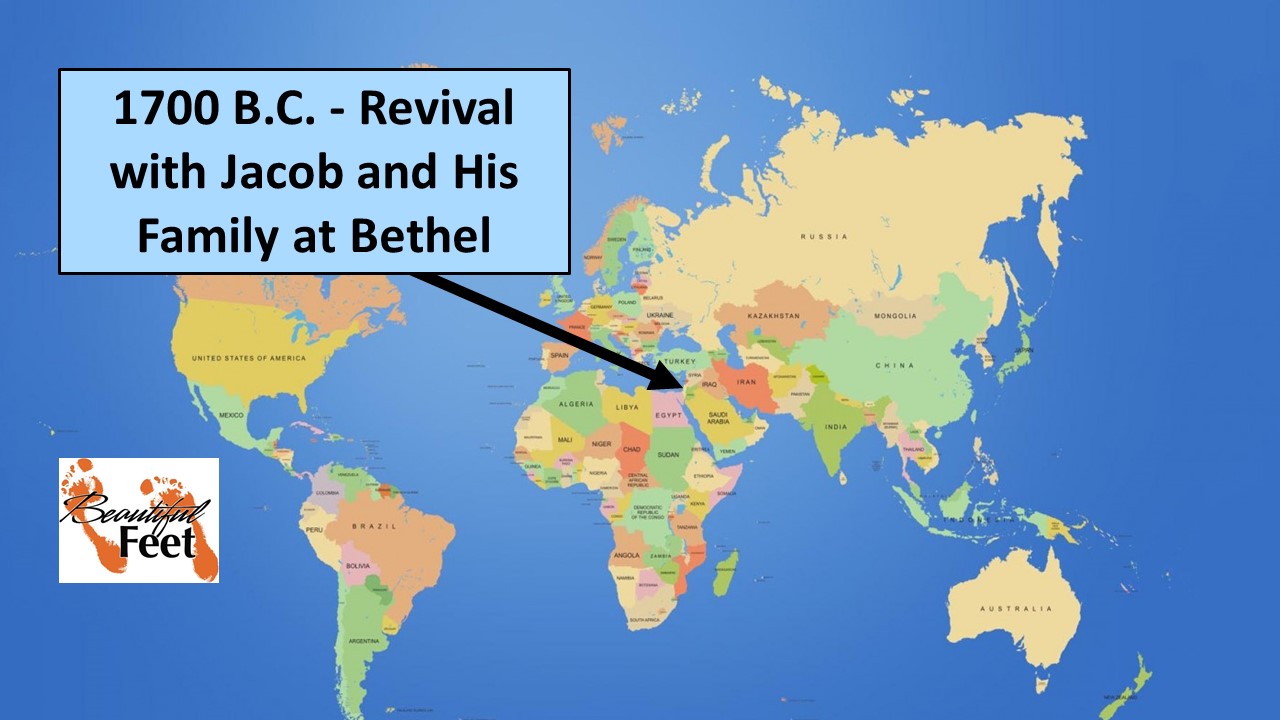
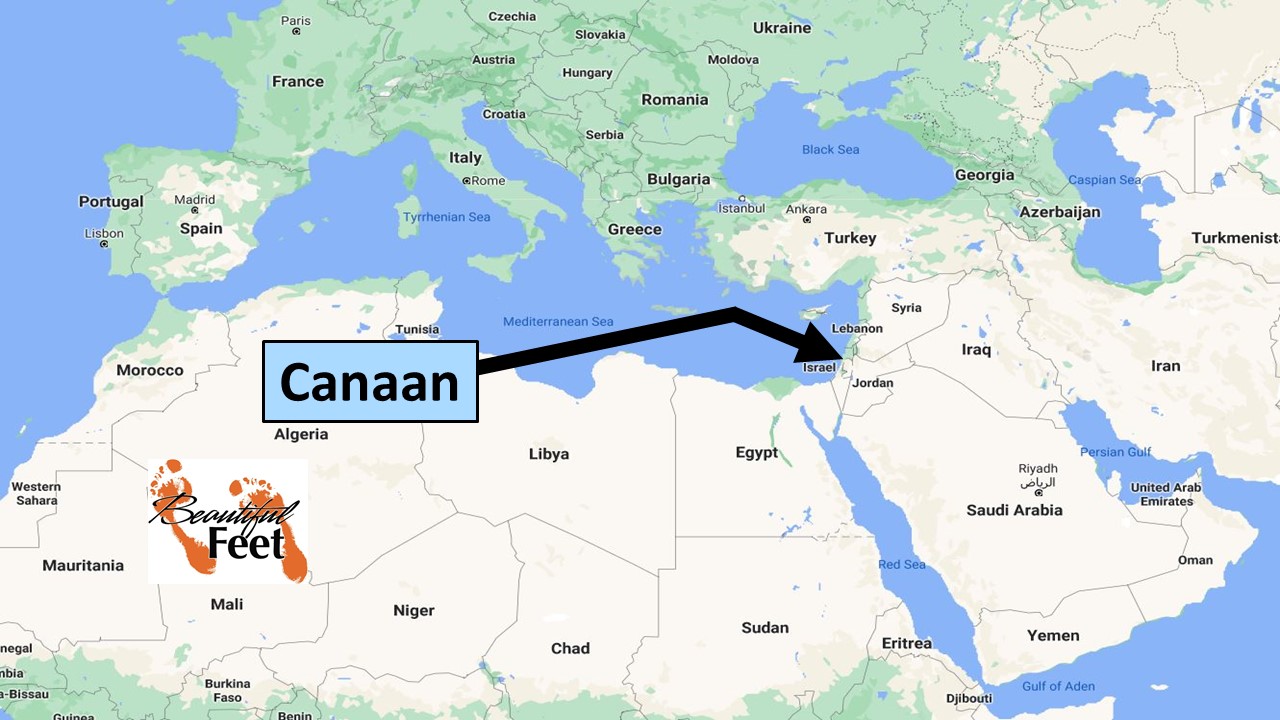
Introduction
This biblical revival account is not intended to be an extensive commentary, giving a lot of spiritual insights on the different aspects of the revival. Our emphasis will be on:
► What led up to the revival,
► What was required of Jacob and his family to renew and revive his relationship with God, and
► What the results were.
We understand that not everyone reading this will have a clear understanding of the sequence of events leading to the development of the nation of Israel, so we have tried, with maps and bullet points, to present a quick explanation, getting us to the main character in the story, Jacob, who later was renamed Israel.
If you are well acquainted with biblical history, feel free to jump down to the heading titled “Prior to the Revival” and start reading there.
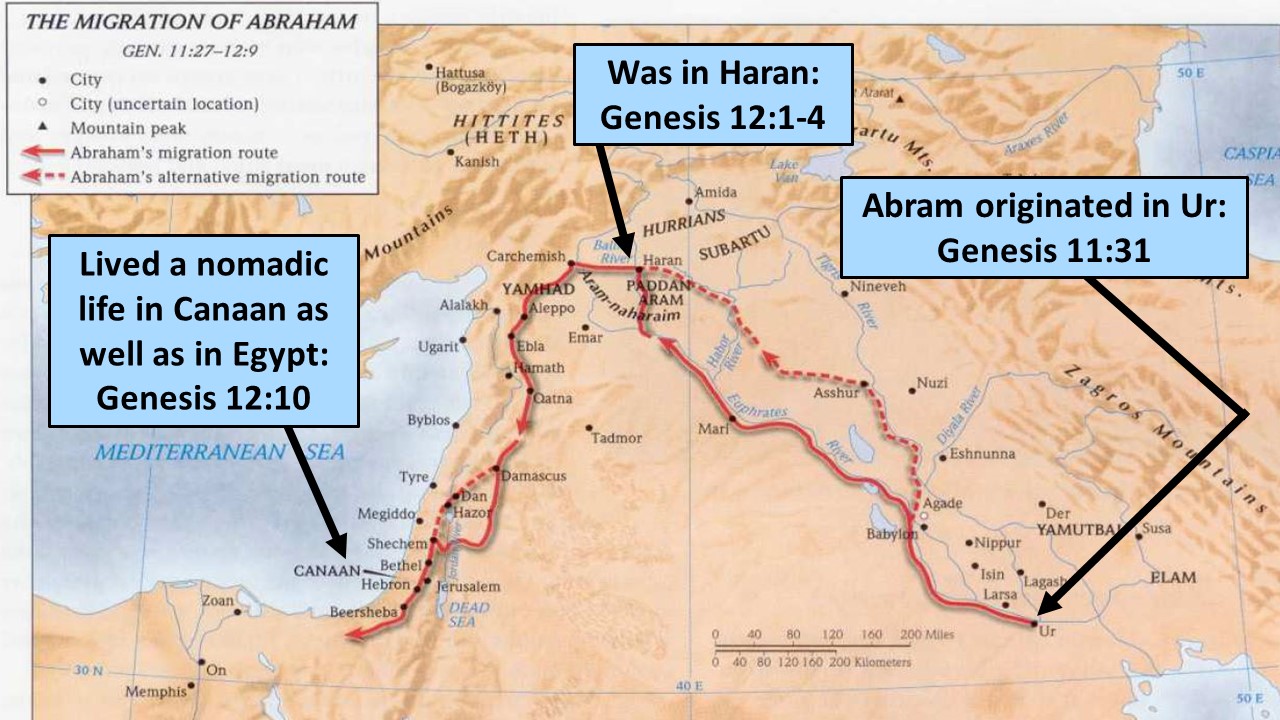
The origin and journeys of Abraham
Initial Formation of the Nation of Israel
► Terah, the father of Abram, migrated from where they were living, in Ur, and moved and settled in Haran (Genesis 11:31).
► After the family settled in Haran, God made a covenant with Abram, which required Abram to move from Haran to Canaan (Genesis 12:1-3).
► After arriving in Canaan, God reconfirmed his covenant with Abram (Genesis 12:4-8).
► God again reconfirmed His covenant with Abram (Genesis 13:14-18).
► God’s covenant with Abram was expanded with the promise of a son who would inherit his wealth (Genesis 15:1-6).
► God changed Abram’s name to Abraham and again expanded on the covenant He made with Abram, with the sign of the covenant being circumcision (Genesis 17:1-14).
► Isaac, the promised son of Abraham and Sarah, was born (Genesis 21:1-3).
Isaac, Son of Abraham
► Abraham arranged for his son Isaac to marry his cousin Rebekah, who was raised in Haran among the extended family (Genesis 24:1-67).
► The covenant God made with Abraham was transferred down to Isaac (Genesis 26:1-5).
► Abraham’s covenant was reconfirmed to Isaac (Genesis 26:23-25).
Isaac’s Two Sons
► Rebekah gave birth to twins, Esau and Jacob (Genesis 25:21-26).
► Jacob was told to marry a woman from Haran, not a woman from any of the Canaanite tribes (Genesis 27:43, 46, 28:1-2, 5).
► Abraham’s covenant with God was confirmed in Jacob (Genesis 28:3-4).
► Jacob left Beersheba for Paddan-aram (Haran) to find a wife from his extended family living there (Genesis 28:10).
► During his journey to Paddan-aram, Jacob arrived at Bethel, where he used a stone as a pillow. In his sleep, while dreaming, God appeared to him, confirming His covenant with him (Genesis 28:11-22).
► Upon waking the next morning, Jacob made a vow God (Genesis 28:18-22).
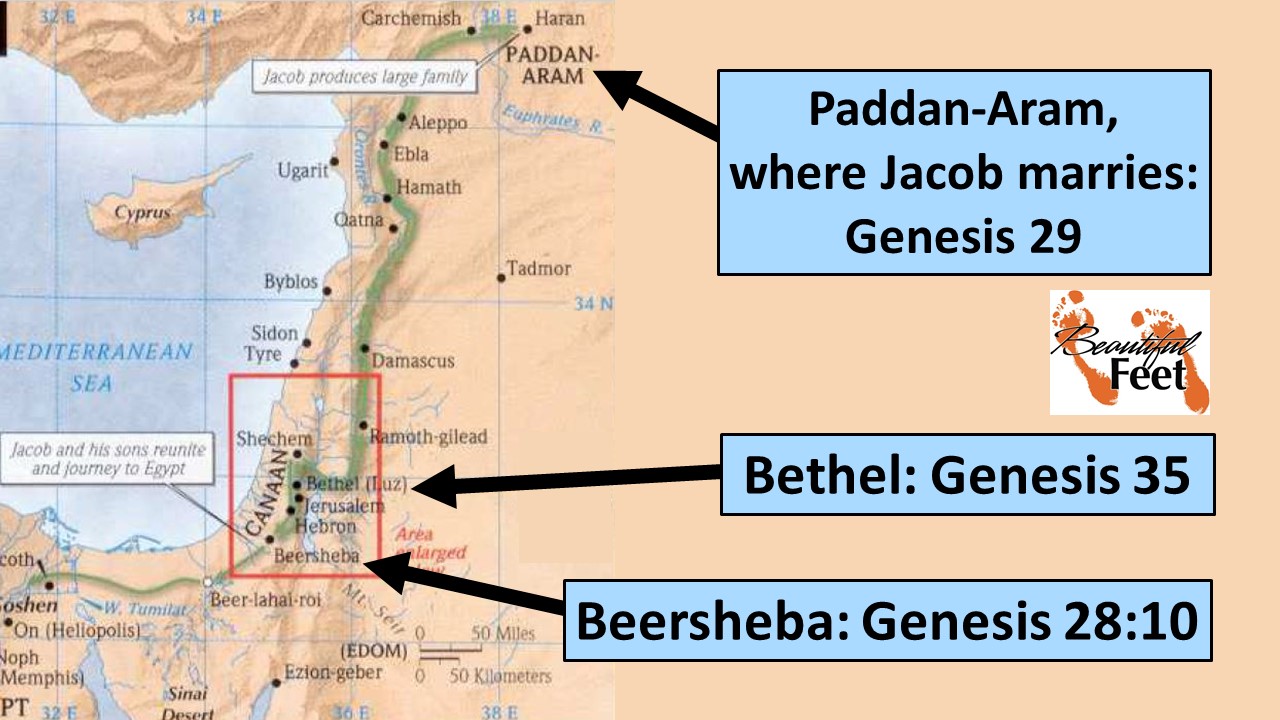
Jacob’s journey from Beersheba, through Bethel, and on to Paddan-aram
Jacob in Paddan-aram
► After arriving in Paddan-aram, Jacob married 2 wives (Rachel and Leah), and two concubines (Bilhah and Zilpah), through whom he had 11 sons and at least 1 daughter (Genesis 29:15-29; 30:3, 9).
► After living in Paddan-aram 20 years, God told Jacob in a dream to return to his family in Canaan (Genesis 31:3).
► God reminded Jacob of the vow he had made to Him upon his departure from Canaan 20 years earlier (Genesis 31:11-13; 28:20-22).
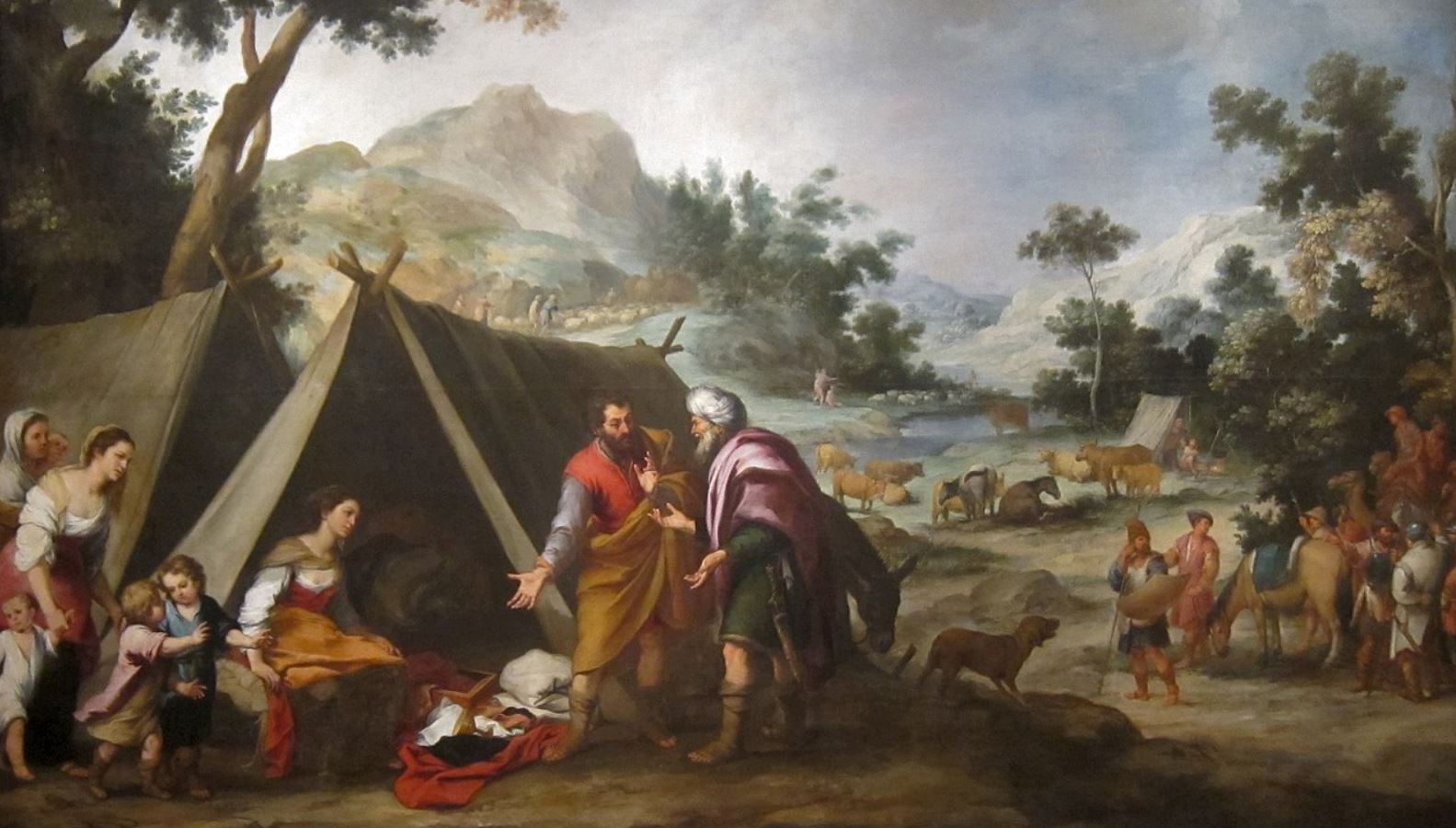
Laban searching tents for his gods
Jacob’s Return to Canaan
► Jacob secretly left with his family and flocks, as he knew Laban would not allow him to leave with all of the wealth he had accumulated during his time in Paddan-aram (Genesis 31:20-21).
► At this same time, Rachel stole her father’s idols–his gods (Genesis 31:19; 30).
► Three days later Laban heard of Jacob’s departure, and he chased after him, catching him 7 days later in Mt. Gilead (Genesis 31:22-23).
► Prior to Laban catching up with Jacob, God had warned him in a dream not to harm Jacob, and the meeting ended in a covenant between the two men (Genesis 31:24; 31:43-53).
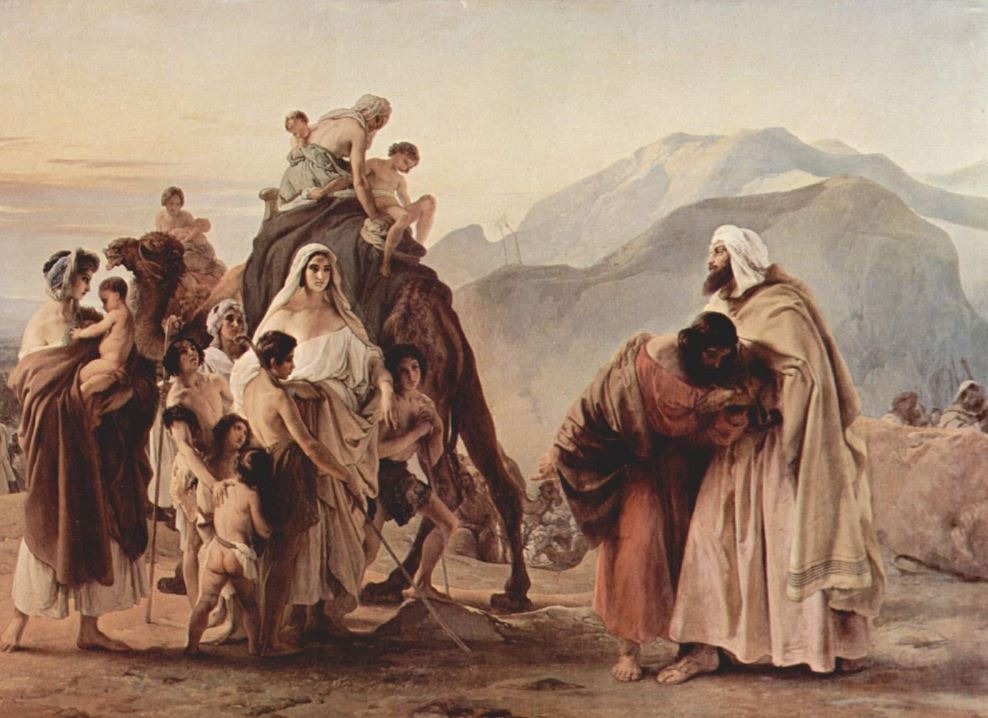
Jacob meets Esau
Reconciliation with Esau
► Twenty years earlier, Esau had vowed to kill Jacob for stealing his birthright. As Jacob was returning to Canaan, he feared this encounter with his brother (Genesis 27:41).
► With God’s covenant of protection resting on Jacob, he was given two camps of angels, one with the family of Leah, and one with the family of Rachel (Genesis 32:1-2).
► The encounter with Esau ended amicably (Genesis 32:3-23; 33:1-16).
Jacob Wrestles with God and Has His Name Changed to Israel
► Jacob received a blessing from the man (God) he wrestled with. It was here that Jacob’s name was changed to Israel (Genesis 32:24-32).
Prior to the Revival
After Jacob’s meeting with his brother Esau, he led his family to the town of Succoth where “he built himself a house and made shelters for his livestock” (Genesis 33:17). It is not known how long he remained there, but he eventually moved again to the town of Shechem, bought some land, and began to settle down (Genesis 33:18-20).
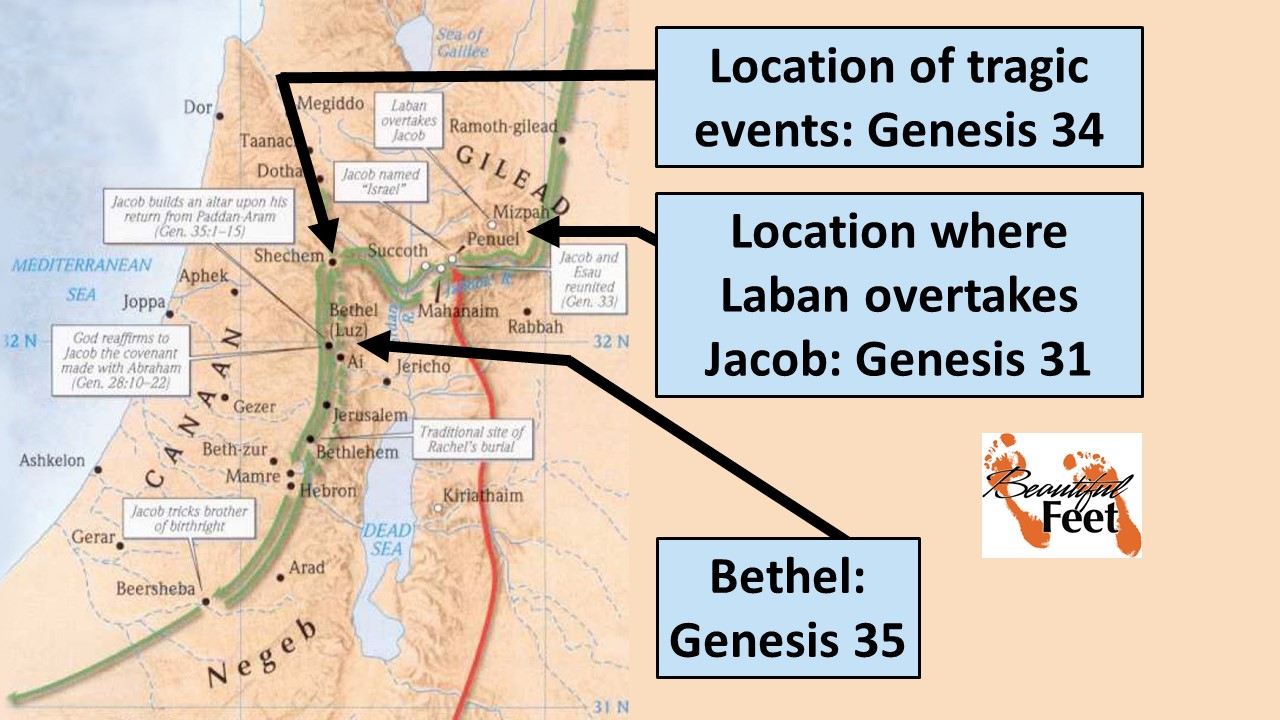
Right click on images to open in another tab and see details
The Shechem Massacre
The duration of time Jacob had been living in Shechem is not known, but on a certain day, when Jacob’s daughter Dinah was visiting Hivite women living in the area, Shechem, the son of Hamor, who was the ruler of that area, raped Dinah (Genesis 34:1-2).
This set off a chain of events which led to Dinah’s two full brothers, Simeon and Levi, entering the town of Shechem with their swords, killing every male, taking all others as slaves, and plundering every home (Genesis 34:3-29).
Hearing of the massacre, Jacob was overwhelmed with fear, knowing that the Canaanites living in the region would hear about it and destroy his entire family (Genesis 34:30-31).
Jacob’s Failure
Though Jacob had vowed that the “Lord would certainly be his God” (Genesis 28:21), he compromised with idols by allowing his family members to worship them, as well as be involved in other pagan rituals (Genesis 31:19; 35:2). As King Solomon had been led away by his foreign wives into idolatry, it is very possible that the same had taken place with Jacob.
Now King Solomon loved many foreign women. Besides Pharaoh’s daughter, he married women from Moab, Ammon, Edom, Sidon, and from among the Hittites. The Lord had clearly instructed the people of Israel, “You must not marry them, because they will turn your hearts to their gods.” Yet Solomon insisted on loving them anyway. He had 700 wives of royal birth and 300 concubines. And in fact, they did turn his heart away from the Lord.
In Solomon’s old age, they turned his heart to worship other gods instead of being completely faithful to the Lord his God, as his father, David, had been. Solomon worshiped Ashtoreth, the goddess of the Sidonians, and Molech, the detestable god of the Ammonites. In this way, Solomon did what was evil in the Lord’s sight; he refused to follow the Lord completely, as his father, David, had done (1 Kings 11:1-6).
What is striking in Jacob’s story is the vow he made to God. This occurred when he spent the night in Bethel, on his way to Paddan-aram (Genesis 28:20-22). Jacob’s vow was contingent on God doing the following for him:
► Being with Jacob on his journeys
► Protecting him
► Providing him with food and clothing
► Allowing him to be brought safely back to his father’s home
God had overwhelmingly carried out what Jacob had requested of him, in return for his devotion. Yet what we find is compromise.
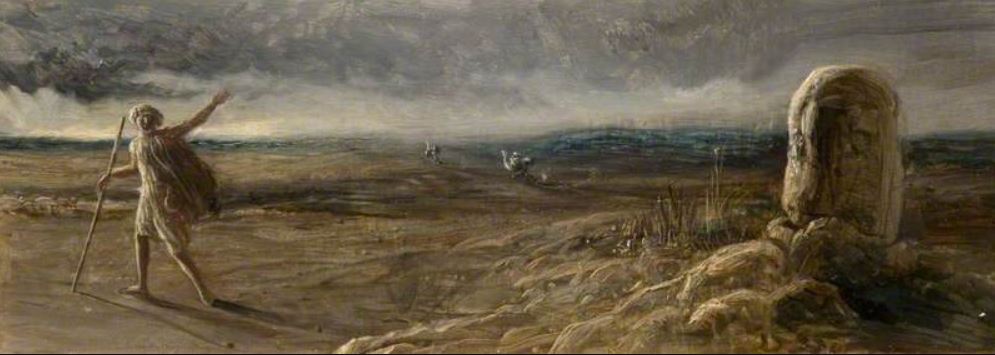
Jacob’s stone
What Happened—Preparation for Worship
After the Shechem massacre, Jacob heard God speak to him:
Get ready and move to Bethel and settle there. Build an altar there to the God who appeared to you when you fled from your brother, Esau (Genesis 35:1).
Jacob knew what this was all about—the keeping of his part of the vow he had made 30 years earlier (Genesis 20:22). God had been faithful to Jacob, but Jacob had not fulfilled his part of the promise.
Having experienced God’s manifest presence at Bethel, Jacob knew the location was holy, so while still in Shechem he spiritually prepared his family prior to taking them there (Genesis 28:16-17). The preparation for going to this holy place involved:
► Bathing (Genesis 35:2)
► Putting on clean clothing (Genesis 35:2)
► Handing over all idols and their earrings, which were undoubtedly associated with pagan beliefs, like an amulet, or talisman (Genesis 35:4).
► All of the idols and earrings were buried “under the great tree near Shechem” (Genesis 35:4).
God’s Promise of Protection Still in Effect
As Jacob’s clan set out for Bethel, God caused a terror to fall upon all the surrounding Canaanites. This was God’s way of protecting Jacob and his household from attacks or revenge for the Shechem massacre (Genesis 35:5).
The Results
► As Jacob obeyed God, the covenant God made with Abraham was again renewed with Jacob (Genesis 35:9-15).
► Prior to Jacob’s death, he transferred the covenant God made with Abraham to two sons of Joseph, Ephraim and Manasseh (Genesis 48:3-20).
► This act perpetuated the Abrahamic covenant through all ages, carrying over into the Church Age (Acts 3:25; Romans 9:8; 11:17; Galatians 3:29).
Primary Source
► Genesis 35:1-15
Return to List of Revival Stories
Chet & Phyllis Swearingen:
Office: (260) 920-8248
romans1015@outlook.com
Beautiful Feet
P.O. Box 915
Auburn, IN 46706

